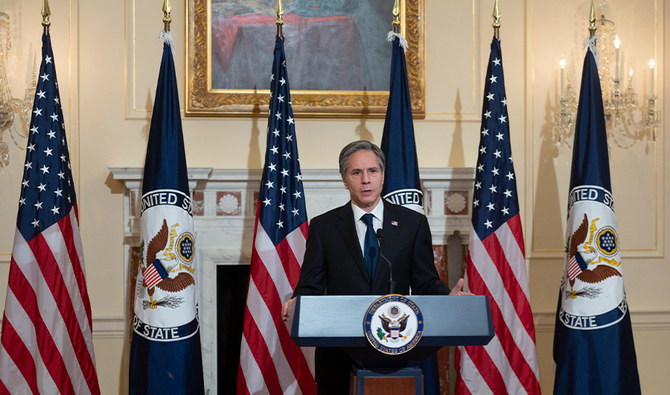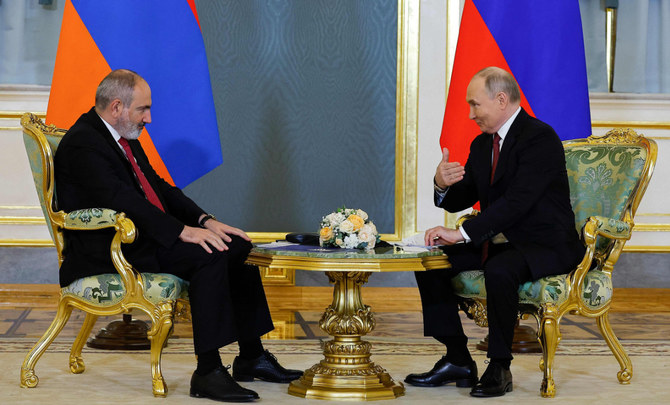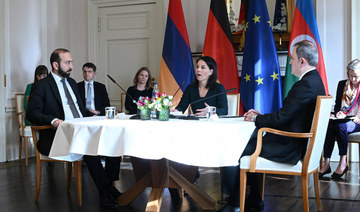KABUL: Frustrated by a stalled peace process and escalating violence, the US has presented an eight-page draft peace agreement to Afghanistan’s warring sides for review.
The US told the parties to come to Turkey in the coming weeks ready to move on it, according to Afghans on both sides of the table.
The draft was obtained by The Associated Press on Monday. The document outlines the terms of a cease-fire and its enforcement, calls for the protection of the rights of women, children and minorities and envisions a truth and reconciliation commission aimed at healing 42 years of conflict.
US State Department spokesman Ned Price would not confirm the draft, saying “It’s often important for our diplomatic efforts that we’re able to conduct them in private.”
The Taliban received the draft and were reviewing it, said spokesman Mohammad Naeem.
There was no immediate comment from Afghan President Ashraf Ghani on the draft proposal or a sternly worded letter from US Secretary of State Antony Blinken.
In the letter, Blinken said Washington wanted to see progress on peace talks and mentioned the draft peace agreement, which calls for a new, inclusive government — which Ghani has resisted. In recent speeches, Ghani has said no interim government would be formed “as long as I am alive.”
But Blinken was uncompromising in his letter, which was released by Afghanistan’s TOLO TV. “I am making this clear to you so that you understand the urgency of my tone regarding collective work,” he wrote.
In the letter, Blinken said a May 1 deadline for a final withdrawal of US troops — stipulated in a Taliban-US deal last year — is still on the table. Even with America’s $4 billion in aid to Afghanistan’s National Security Forces, a US withdrawal could mean quick territorial gains for the Taliban.
Ghani’s first vice president, Amrullah Saleh, said the president had received the letter and was unmoved by its contents. He said Ghani was not ready to embrace the secretary of state’s accelerated pace toward a settlement.
“We are neither concerned about the letter nor has it changed our position,” Saleh said. He thanked the US for its sacrifices and financial assistance over the past 20 years but said the Afghan government won’t succumb to dictation.
“We will make peace with dignity, but never . . . an imposed peace,” he said at a ceremony on the anniversary of the death of a former defense minister. Ghani has been accused by his political opponents of trying to cling to power at all cost.
Fawzia Koofi, one of only four women at the negotiation table in Doha, warned against haste and a May 1 withdrawal of US troops, saying it would cause chaos. She confirmed that all sides had received the US-crafted draft agreement.
“One thing that is important is that Afghan ownership and Afghan leadership must be respected,” she said in a phone interview from Doha. “The process should not be rushed.”
Blinken’s letter proposes a revised plan for a 90-day reduction in violence that would prevent the start of a spring offensive by the Taliban and would be followed by a permanent cease-fire laid out in the draft peace agreement.
Both sides would stop fighting within hours of the agreement being signed, according to the draft. The Taliban would remove all its military and military structures from neighboring countries — a reference to Pakistan, where the leadership currently resides. The draft agreement also calls for an independent commission to oversee cease-fire violations.
The preamble of the US document says the draft peace agreement is intended to jump-start negotiations.
“It sets forth principles for governance, security, and rule of law and presents options for power sharing that could help the two sides reach a political settlement that ends the war,” it says.
The preamble portrayed the draft as a compilation of “ideas and priorities” of Afghans on all sides of the political spectrum.
The draft lays out an ambitious road map that protects the rights of all, guarantees elections, demands transparency and a fight against corruption and the illicit drug trade. It demands guarantees of non-interference from Afghanistan’s neighbors and guarantees from Afghanistan that the country won’t be used to attack or interfere with another.
It proposes the establishment of a “peace government” that would oversee the writing of a new constitution and elections held immediately afterward. The new constitution is to protect the rights gained in the last 20 years since the toppling of the Taliban.
According to the draft, the peace government would include separate, but equal branches, including the judiciary, and executive branch.
The draft also said there will be one national government, no parallel governments and no parallel security forces, which would mean an end to Taliban fighters and the many militias loyal to warlords holding sway in Kabul.
It promises to protect Islamic values and while an independent judiciary would have the ultimate authority, the High Council for Islamic Jurisprudence would have an advisory role.
“The new peace plan offers a chance for a cease-fire, it offers a chance to bring the Taliban from the battlefield to the talks table to discuss thorny issues of religion and its role in (the state),” without giving them all the power, said Torek Farhadi, former Afghan government adviser.
“Afghanistan is bordering on a failed state status and is sure to enter the category immediately after the withdrawal of the foreign forces absent a better political arrangement,” he said, ” That is the reality of Afghanistan.”
US presents warring Afghan sides with draft peace agreement
https://arab.news/6wx39
US presents warring Afghan sides with draft peace agreement

- The draft says there will be one national government, no parallel governments and no parallel security forces
- Document calls for protection of rights of women, children and minorities and envisions a truth and reconciliation commission
Armenia’s prime minister in Russia for talks amid strain in ties

- Putin hosted Nikol Pashinyan for talks following a summit of the Eurasian Economic Union, a Moscow-dominated economic alliance
- Armenia’s ties with its longtime sponsor and ally Russia have grown increasingly strained after Azerbaijan waged a lightning military campaign in September to reclaim the Karabakh region
Armenia’s prime minister in Russia for talks amid strain in ties
Putin hosted Nikol Pashinyan for talks following a summit of the Eurasian Economic Union, a Moscow-dominated economic alliance
MOSCOW: Armenia’s prime minister visited Moscow and held talks Wednesday with Russian President Vladimir Putin amid spiraling tensions between the estranged allies.
Putin hosted Nikol Pashinyan for talks following a summit of the Eurasian Economic Union, a Moscow-dominated economic alliance. that they both attended earlier in the day. The negotiations came a day after Putin began his fifth term at a glittering Kremlin inauguration.
In brief remarks at the start of the talks, Putin said that bilateral trade was growing, but acknowledged “some issues concerning security in the region.”
Pashinyan, who last visited Moscow in December, said that “certain issues have piled up since then.”
Armenia’s ties with its longtime sponsor and ally Russia have grown increasingly strained after Azerbaijan waged a lightning military campaign in September to reclaim the Karabakh region, ending three decades of ethnic Armenian separatists’ rule there.
Armenian authorities accused Russian peacekeepers who were deployed to Nagorno-Karabakh after the previous round of hostilities in 2020 of failing to stop Azerbaijan’s onslaught. Moscow, which has a military base in Armenia, has rejected the accusations, arguing that its troops didn’t have a mandate to intervene.
The Kremlin, in turn, has been angered by Pashinyan’s efforts to deepen ties with the West and distance his country from Moscow-dominated security and economic alliances.
Just as Pashinyan was visiting Moscow on Wednesday, Armenia’s Foreign Ministry announced that the country will stop paying fees to the Collective Security Treaty Organization, a Russia-dominated security pact. Armenia has previously suspended its participation in the grouping as Pashinyan has sought to bolster ties with the European Union and NATO.
Russia was also vexed by Armenia’s decision to join the International Criminal Court, which last year indicted Putin for alleged war crimes connected to the Russian action in Ukraine.
Moscow, busy with the Ukrainian conflict that has dragged into a third year, has publicly voiced concern about Yerevan’s westward shift but sought to downplay the differences.
Kremlin spokesman Dmitry Peskov conceded Tuesday that “there are certain problems in our bilateral relations,” but added that “there is a political will to continue the dialogue.”
AstraZeneca to withdraw COVID vaccine globally as demand dips

- AstraZeneca says initiated worldwide withdrawal due to “surplus of available updated vaccines”
- Drugmaker has previously admitted vaccine causes side effects such as blood clots, low blood platelet counts
AstraZeneca said on Tuesday it had initiated the worldwide withdrawal of its COVID-19 vaccine due to a “surplus of available updated vaccines” since the pandemic.
The company also said it would proceed to withdraw the vaccine Vaxzevria’s marketing authorizations within Europe.
“As multiple, variant COVID-19 vaccines have since been developed there is a surplus of available updated vaccines,” the company said, adding that this had led to a decline in demand for Vaxzevria, which is no longer being manufactured or supplied.
According to media reports, the Anglo-Swedish drugmaker has previously admitted in court documents that the vaccine causes side-effects such as blood clots and low blood platelet counts.
The firm’s application to withdraw the vaccine was made on March 5 and came into effect on May 7, according to the Telegraph, which first reported the development.
The Serum Institute of India (SII), which produced AstraZeneca’s COVID-19 vaccine under the brand name Covishield, stopped manufacturing and supply of the doses since December 2021, an SII spokesperson said.
London-listed AstraZeneca began moving into respiratory syncytial virus vaccines and obesity drugs through several deals last year after a slowdown in growth as COVID-19 medicine sales declined.
Ex-national security adviser criticizes UK PM for not suspending arms sales to Israel

- Lord Peter Ricketts: ‘Pity’ govt ‘could not have taken a stand on this and got out ahead of the US’
- American decision to pause delivery of weapons seen as warning to Israel to abandon or temper plan to invade Rafah
LONDON: A former UK national security adviser has condemned Prime Minister Rishi Sunak for failing to suspend weapons sales to Israel, The Independent reported on Wednesday.
After the US paused a delivery of bombs, Sunak has yet to follow suit despite mounting pressure from within his own Conservative Party.
Lord Peter Ricketts, a life peer in the House of Lords and retired senior diplomat, said Britain should have been “ahead of the US” in ending arms sales to Israel.
The US decision to pause the shipment of bombs is seen as a warning to Israel to abandon or temper its plan to invade Rafah in southern Gaza.
More than 1 million Palestinian civilians are sheltering in the city after being forced out of northern sections of the enclave.
Ricketts said it is a “pity” that “the government could not have taken a stand on this and got out ahead of the US.”
Conservative MP David Jones made the same call in comments to The Independent, saying: “We should give similar consideration to a pause.”
He added: “Anyone viewing the distressing scenes in Gaza will want to see an end to the fighting. Hamas is in reality beaten. Now is the time for diplomacy to bring this dreadful conflict to an end.”
At Prime Minister’s Questions in the House of Commons, Sunak faced a flurry of questions over Britain’s potential ties to an Israeli invasion of Rafah. He said the government’s position remains “unchanged.”
Taliban deny Pakistani claims of Afghan involvement in attack on Chinese workers

- According to Islamabad, suicide attack that killed 5 Chinese in Pakistan was planned in Afghanistan
- Afghan Defense Ministry says the March attack showed weakness of Pakistan’s security agencies
KABUL: The Taliban on Wednesday rejected allegations of Afghan involvement in a recent deadly attack on Chinese workers in neighboring Pakistan.
The five Chinese nationals, who were employed on the site of a hydropower project in Dasu in northwestern Khyber Pakhtunkhwa province bordering Afghanistan, were killed alongside their driver in a suicide blast on March 26.
Pakistan’s military said on Tuesday that the attack was planned in Afghanistan and that the suicide bomber was an Afghan citizen.
Maj. Gen. Ahmad Sharif, a spokesperson for Pakistan’s army, also told reporters that Islamabad had “solid evidence” of militants using Afghan soil to launch attacks in Pakistan, that since the beginning of the year such assaults had killed more than 60 security personnel and that authorities in Kabul were unhelpful in addressing the violence.
The Taliban’s Ministry of Defense responded on Wednesday that the claims were “irresponsible and far from the reality.
“Blaming Afghanistan for such incidents is a failed attempt to divert attention from the truth, and we strongly reject it,” Enayatullah Khwarazmi, the ministry’s spokesperson, said in a statement.
“The killing of Chinese citizens in an area of Khyber Pakhtunkhwa, which is under tight security cover of the Pakistani army, shows the weakness of the Pakistani security agencies or cooperation with the attackers.”
The Dasu attack followed two other major assaults in regions where China has invested more than $65 billion in infrastructure projects as part of its wider Belt and Road Initiative.
On March 25, a naval air base was attacked in Turbat in Pakistan’s Balochistan province, and on March 20, militants stormed a government compound in nearby Gwadar district, which is home to a Chinese-operated port.
Pakistan is home to twin insurgencies, one by militants related to the Tehreek-e-Taliban Pakistan — the Pakistani Taliban — and the other by ethnic separatists who seek secession in southwestern Balochistan province, which remains Pakistan’s poorest despite being rich in natural resources.
While the attacks in Balochistan were claimed by the Baloch Liberation Army — the most prominent of several separatist groups in the province, no group claimed responsibility for the one in Dasu.
Blaming it on Afghanistan, however, was “baseless,” according to Naseer Ahmad Nawidy, an international relations professor at Salam University in Kabul.
“The insurgency in the region has existed for very long now and cannot be attributed to a specific area or country. Pakistan looks at the Islamic Emirate in its current form as a threat to its interests. The Pakistan government needs to develop its relations with the Islamic Emirate based on equal rights and goodwill for stability in the whole region,” Nawidy told Arab News.
“Stability in the region requires mutual cooperation and trust. The governments in Afghanistan and Pakistan must end the relations crisis at the earliest. Repeating such claims will further increase the tensions and may cause enmity between the two countries.”
Abdul Saboor Mubariz, a political scientist and lecturer at Alfalah University in Jalalabad, said that Pakistan’s claims were meant to put pressure on the Taliban to help Islamabad in its campaign against the TTP.
“Pakistan’s government is using different forms of pressure such as forcible deportation of Afghan refugees, claims about security threats from Afghanistan, closing border points and creating challenges for Afghan traders,” he said, adding that accusations and claims of links to attacks were affecting the Taliban administration as it still sought recognition from foreign governments.
“The claims are critical for the Islamic Emirate as it is seeking engagement with the countries in the region and across the globe, while the government remains unrecognized by all world countries.”
India PM Modi’s party deletes X post accused of targeting Muslims

- Video featured opposition politicians scheming to abolish programs for marginalized Hindus, distribute them to Muslims
- India’s PM Modi, expected to win polls, has made controversial remarks in election speeches, referring to Muslims as “infiltrators”
New Delhi: Indian Prime Minister Narendra Modi’s party on Wednesday deleted a cartoon video posted on social media platform X that was criticized for targeting minority Muslims during an ongoing national election.
India’s election code bans campaigning based on “communal” incitement but the Hindu-nationalist Bharatiya Janata Party (BJP) has frequently invoked the country’s main religious divide on the campaign trail.
The video, posted by an official BJP account, featured caricatures of opposition politicians scheming to abolish special affirmative action programs for marginalized Hindu groups and instead distribute them to Muslims.
The election commission wrote to the platform’s Indian office on Tuesday saying the “objectionable” post violated Indian law.
On Wednesday the original post had disappeared from the platform, with a notice saying it had been deleted.
A police complaint filed by the opposition Congress party accused the video of promoting “enmity between different religions.”
Modi, who is widely expected to win a third term in office when the six-week general election concludes next month, has made similar claims to the video in campaign appearances since last month.
He has used public speeches to refer to Muslims as “infiltrators” and “those who have more children,” prompting condemnation from opposition politicians, who have complained to election authorities.
On Tuesday he again said that his political opponents would “snatch” affirmative action policies meant for disadvantaged Hindus and redirect them to Muslims.
Modi remains widely popular a decade after coming to power, in large part due to his government’s positioning of the nation’s majority faith at the center of its politics, despite India’s officially secular constitution.
That in turn has made India’s 220-million-plus Muslim population increasingly anxious about their future in the country.
The BJP last month published another contentious animated video on Instagram in which a voiceover warned that if the opposition came to power, “it will snatch all the money and wealth from non-Muslims and distribute them among Muslims, their favorite community.”
The video was removed after several users reported it for “hate speech.”















